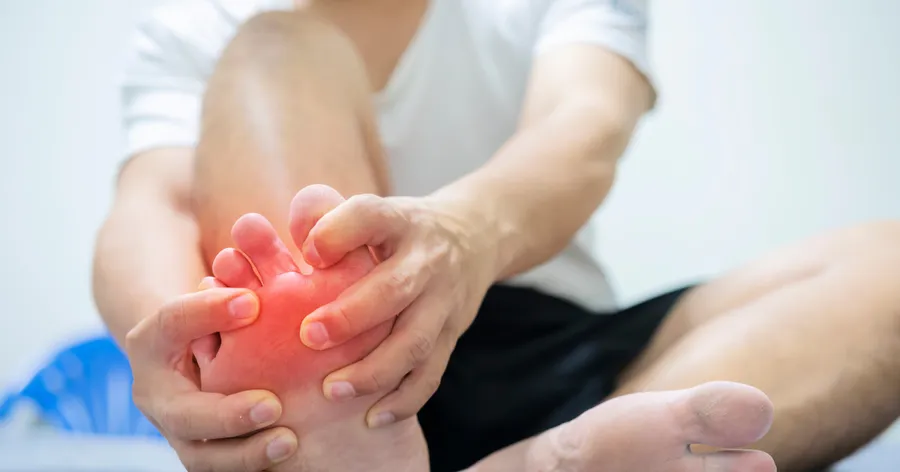Gout is a form of inflammatory arthritis characterized by sudden and severe attacks of pain, swelling, redness, and tenderness in the joints, often affecting the big toe. Understanding the symptoms and triggers of a gout attack is crucial for managing the condition effectively. Here’s a deep dive into gout attacks:
Symptoms of a Gout Attack:
- Sudden Joint Pain:
- Gout attacks typically manifest as a sudden onset of intense joint pain, often in the big toe. However, other joints like the ankles, knees, elbows, wrists, and fingers can also be affected.
- Swelling and Inflammation:
- The affected joint becomes swollen, red, and inflamed during a gout attack. This swelling is a result of the accumulation of urate crystals in the joint.
- Tenderness to Touch:
- The joint is extremely tender and sensitive to touch. Even the lightest pressure on the affected area can cause significant pain.
- Limited Range of Motion:
- The inflammation and pain can lead to a decreased range of motion in the affected joint during a gout attack.
- Warmth in the Joint:
- The joint may feel warm to the touch due to the inflammation caused by the accumulation of urate crystals.
- Fever and Chills:
- In some cases, individuals experiencing a gout attack may develop a low-grade fever and experience chills.
Triggers of Gout Attacks:
- High Uric Acid Levels:
- Gout is primarily caused by elevated levels of uric acid in the blood, a condition known as hyperuricemia. When uric acid levels become too high, urate crystals can form in the joints, triggering an inflammatory response.
- Dietary Factors:
- Certain foods high in purines, such as red meat, organ meats, seafood, and sugary beverages, can contribute to increased uric acid levels and trigger gout attacks.
- Alcohol Consumption:
- Alcohol, particularly beer and spirits, is linked to an increased risk of gout attacks. Beer, in particular, has been associated with a higher incidence of gout due to its purine content.
- Dehydration:
- Inadequate fluid intake can lead to dehydration, concentrating uric acid in the blood and increasing the likelihood of urate crystal formation.
- Obesity:
- Excess body weight is a risk factor for gout. Obesity is associated with higher uric acid levels and an increased likelihood of gout attacks.
- Certain Medications:
- Some medications, such as diuretics (water pills) and certain immunosuppressants, can contribute to elevated uric acid levels and trigger gout attacks.
- Medical Conditions:
- Conditions such as hypertension, diabetes, and metabolic syndrome are linked to an increased risk of gout.
- Genetics:
- Family history plays a role in gout risk. If close relatives have experienced gout, there may be a genetic predisposition.
- Joint Injury or Surgery:
- Physical trauma to a joint, such as injury or surgery, can trigger a gout attack in susceptible individuals.
- Gender and Age:
- Gout is more common in men than women, and the risk increases with age. Women’s risk may rise after menopause.
Management and Prevention:
- Medication:
- Medications such as nonsteroidal anti-inflammatory drugs (NSAIDs), colchicine, and corticosteroids are often prescribed to manage pain and inflammation during gout attacks.
- Lifestyle Modifications:
- Adopting a low-purine diet, limiting alcohol intake, staying hydrated, and maintaining a healthy weight are essential lifestyle modifications for managing and preventing gout attacks.
- Urate-Lowering Medications:
- For individuals with recurrent gout attacks or high uric acid levels, medications like allopurinol or febuxostat may be prescribed to lower uric acid levels.
- Regular Monitoring:
- Regular monitoring of uric acid levels and maintaining a healthy lifestyle are crucial for preventing gout attacks in the long term.
- Joint Protection:
- Protecting joints from injury, maintaining joint flexibility through exercise, and using supportive footwear can help reduce the risk of gout attacks.
Understanding the symptoms and triggers of gout attacks is essential for effective management and prevention. Individuals experiencing symptoms of gout should seek medical attention for an accurate diagnosis and appropriate treatment. Adopting a comprehensive approach that includes lifestyle modifications and, if necessary, medication, can significantly improve the quality of life for those with gout.

